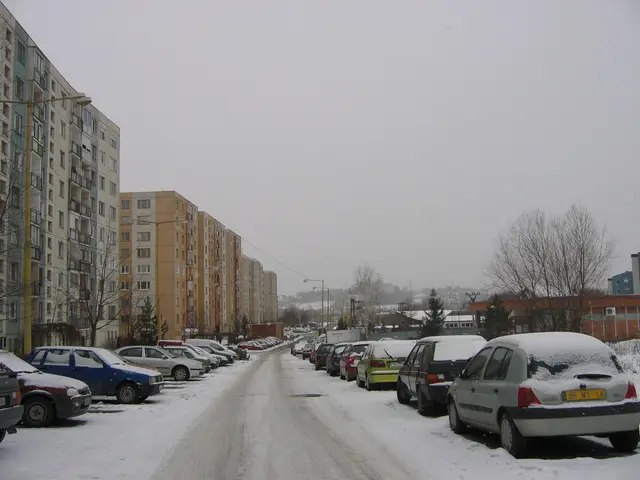Public advocates push for increased public meetings regarding the incinerator issue.
Title: Incinerator in Mingjian Township: A Contentious Plan Facing Environmental Concerns and Public Outcry
Written by Bree Zeke
The planned incinerator in Mingjian Township of Nantou County has sparked controversy and upset over cross-county environmental impacts, as both residents and environmentalists worry that it will cause more severe pollution in neighboring regions, particularly in Changhua County.
At a news conference, Democratic Progressive Party Legislator Chen Su-yueh pointed out that the flying ash from the proposed incinerator in Mingjian Township would not remain confined within administrative boundaries, especially as wind direction changes with the seasons. Consequently, she demanded that the Ministry of Environment conduct a thorough review of the project's environmental impact assessment (EIA) to prevent conflicts of interest.
Chen urged the Ministry to hold public hearings in neighboring regions, as the county government has only hosted 10 hearings in Mingjian Township. Among these neighboring regions, Ershuei Township in Changhua County, Jhushan Township and Yunlin County's Linnei Township in Nantou County, and parts of Linnei Township in Yunlin County are at risk of facing increased pollution from the incinerator's emissions.
According to the Changhua Environmental Protection Union, the site chosen for the incinerator is near the Jhuoshuei River and within 1,200 meters of Ershuei Township. Changhua County's waste generation decreased by 15.2 percent between 2022 and 2023, whereas Nantou County’s waste generation reported just a 1.3 percent increase. This discrepancy raises concerns about Nantou County’s dedication to recycling efforts.
If Nantou County were to mimic Changhua County's resource and food waste recycling approach, it could process its waste more efficiently, potentially reducing waste by up to 20,000 tonnes yearly. The Changhua County Environmental Protection Bureau enforced waste sorting and trash bag inspections, lowering the amount of waste generated per capita by around 20 percent between 2022 and 2023.
The incinerator's potential environmental impacts on Changhua County are not only pertinent to air quality, but also to water and soil contamination. The ash and emissions from the incinerator could pollute the groundwater, soil, and farming areas if proper precautions are not taken.
Concerns about agricultural threats are also present, as Changhua County, known as Taiwan's "rice basket," faces a potential risk of crop contamination. Tomakin Gasification, a solid recovered fuel facility located in Houli District of Taoyuan City, started operations in 2020 and reportedly generated excessive amounts of dust and harmful emissions. This complex is just one example highlighting the potential risks that incinerators can pose to nearby agricultural lands.
Members of the Mingjian Township Anti-Incinerator Self-Help Group oppose the construction of the incinerator, citing its harm to the tea and leafy vegetable production areas of Mingjian Township, which could potentially be contaminated by heavy metals or dioxins. Theyfear the incinerator could entice illegal waste disposal, damaging Nantou County's natural resources due to limited enforcement capacity.
The Nantou County Government and Mingjian Township Mayor Chen Han-li have faced backlash for the removal of over 200 protest banners against the project and fines for contravening the Waste Disposal Act. Critics argue that this action infringes on residents' right toexpression as citizens living in a free and democratic society.
Some question whether the experts responsible for reviewing the project have conflicts of interest since they were hired by the Nantou County Government. The Taiwan Watch Institute suggests that the EIA should be reviewed by the Ministry of the Environment or representatives recommended by Mingjian Township instead.
In response, the Ministry of the Environment stated that incinerator construction should conduct a two-phase EIA, and the project must notify adjacent administrative areas about the EIA's second phase and hold public hearings as required by law.
- The Mingjian Township Anti-Incinerator Self-Help Group contends that the proposed incinerator in Mingjian Township could harm the tea and vegetable production areas due to potential contamination by heavy metals or dioxins.
- The incinerator's impact on Changhua County extends beyond air quality concerns, as it raises alarms about water and soil contamination, potentially polluting groundwater, soil, and farming areas if safety measures are insufficient.
- Democratic Progressive Party Legislator Chen Su-yueh has advocated for the Ministry of Environment to conduct a comprehensive review of the EIA, including public hearings in neighboring regions to gather diverse perspectives and prevent conflicts of interest.
- The controversies surrounding the incinerator project, including the removal of protest banners and fines for contravention of the Waste Disposal Act, have sparked discussions about conflicts of interest and the importance of public transparency in environmental-science matters, intertwining science, politics, and general-news discourse.







